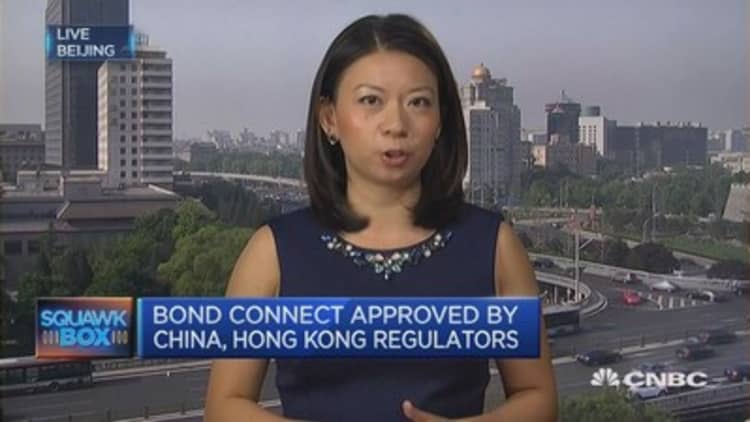
China is taking another step to open up its financial markets to the world by allowing overseas investors access to China's $9.5 trillion bond market.
Regulators in Hong Kong and China have approved a program that will allow investors operating in Hong Kong to trade in the Chinese bond market. Initially, only "northbound" trading will be possible — investment flow from Hong Kong into China — with "southbound" flow to be considered later, according to a joint statement from the People's Bank of China and the Hong Kong Monetary Authority. Authorities also won't cap the amount that foreigners can invest in China.
The "bond connect" scheme is China's latest move to broaden access to its financial markets, which have largely been restricted to the world. Right now, less than 2 percent of China's bonds are held by foreign investors, and trading volume is typically low. By initially only allowing flow in one direction — from offshore to onshore — authorities are trying to counter the pressure of money fleeing the country and encouraging more robust domestic markets.
The program "is conducive to the consolidation and enhancement of Hong Kong's status as an international financial center, to the steady and progressive opening-up of the mainland financial markets, to the diversification of investment channels for overseas investors and to the long-term prosperity and stability of Hong Kong," the HKMA and PBOC statement said.
Although a launch date has yet to be announced, approval of the program was highly anticipated as Beijing officials had made it clear the bond trading link was a priority.
In the long run, more trading conducted in yuan could support Beijing's efforts to promote the currency for wider global use.
The approval may be good timing as early next month, index provider MSCI will announce whether it will include mainland-traded shares of Chinese companies — called A-shares — in its widely-tracked global benchmarks. MSCI has rejected Shanghai and Shenzhen-traded stocks from inclusion for the last three years, saying China needed to install more reforms to increase market transparency.
But it's still too early to gauge the appetite among foreign investors. While exposure to the world's second-largest economy may mean attractive rewards, there are still a number of risks.
One concern is currency volatility, as the yuan has suffered downward pressure amid high capital outflows. Another is the challenge of taking any gains out of the country, given tight capital controls. The curbs could, however, prompt money to be re-invested inside China – which authorities are likely keen to welcome.
Similar trading programs linking Hong Kong to the Shanghai and Shenzhen stock markets launched in 2014 and 2016, respectively.
The "bond connect marks another milestone in the liberalization of the mainland's capital account," said Norman Chan, chief executive of the HKMA. Through the platform, Hong Kong will leverage its "role as an international financial center, as well as an intermediary for capital flows between the mainland and international markets."


